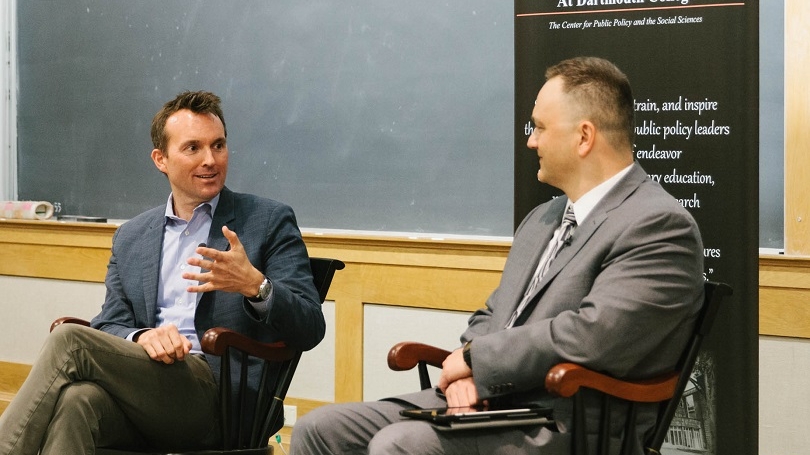
- Public Policy
- Leadership
- Funding
- News & Events
- About the Center
Back to Top Nav
Back to Top Nav
Back to Top Nav
Back to Top Nav
Many Dartmouth alumni reach high positions of leadership after graduation, leaving students wondering how they can fashion their paths to lead to such success. One of the most notable instances of alumni leadership in recent times has been slightly atypical, in that it comes in the form of civilian leadership of the armed forces. On Thursday, May 18 Dean Lacy, Professor of Government and Director of the Program in Politics and Law at Dartmouth, had a conversation with Eric Fanning '90 in Filene Auditorium in Moore Hall, titled “From Dartmouth to the Pentagon: A Conversation with Eric Fanning ’90.” This event was part of the Rockefeller Center’s 2017 Spring Term public programming, was co-sponsored with Alumni Leadership, and was open to the community.
The Honorable Eric Fanning, 22nd Secretary of the Army, spoke about his path after graduating from Dartmouth. In particular, he focused on the experiences that led to his appointment as Secretary of the Army by President Barack Obama in 2016. Former Secretary Fanning was the first person to have held senior Presidential appointments in all three military departments – and public service, as well as in the private sector.
As Secretary of the Army, Fanning had statutory responsibility for all matters relating to the United States Army, its $147 billion budget, and it’s 1.4 million people: manpower, personnel, reserve affairs, installations, environmental issues, weapons systems and equipment acquisition, communications, and financial management.
Prior to his appointment as the 22nd Secretary of the Army, Eric Fanning served as the Acting Secretary of the Army, the Under Secretary of the Army, the Chief Management Office of the Army, and the Chief of Staff to the Secretary of Defense. He also served as the 24th Under Secretary of the Air Force, the Acting Secretary of the Air Force, the Deputy Under Secretary of the Navy and Deputy Chief Management Officer of the Navy, and the Deputy Director of the Commission on the Prevention of Weapons of Mass Destruction Proliferation and Terrorism.
Before entering public service, he was managing director at CMG, a strategic communications firm, and Senior Vice President for Strategic Development at a DC-based think tank, Business Executives for National Security (BENS). Prior to that, he worked at another strategic communications firm – Robinson, Lerer & Montgomery. Prior to that, he also worked at CBS National News, with the House Armed Services Committee, with the Immediate Office of the Secretary of Defense, and with the Associate Director of Political Affairs at the White House.
Submitted by Olivia Bewley ’19, Rockefeller Center Student Program Assistant for Public Programs
The views and opinions expressed and any materials presented during a public program are the speaker’s own and do not necessarily represent the views and opinions of the Rockefeller Center or constitute an endorsement by the Center.